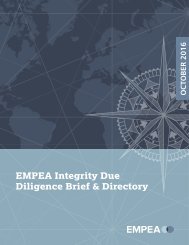Create successful ePaper yourself
Turn your PDF publications into a flip-book with our unique Google optimized e-Paper software.
management extends to monitoring company revenues and<br />
inventory, being co-signatory to checks issued by the investee<br />
companies, preparing Board meetings and the basis for<br />
decisions to be taken, etc.<br />
Strengthening the local presence <strong>of</strong> PE fund managers is a<br />
necessary complement to extending the support provided<br />
by PE funds to early stage, smaller investee companies and<br />
entrepreneurs. While some ‘onshoring’ <strong>of</strong> such capacity has<br />
started to take place in Nairobi and Lagos, strengthening the<br />
presence <strong>of</strong> PE funds under local management is important<br />
both from the perspective <strong>of</strong> enhancing growth <strong>of</strong> the PE<br />
industry 23 and so as to gain understanding and acceptance<br />
<strong>of</strong> PE investment among local institutional investors.<br />
Locally-domiciled PE fund management teams need to<br />
gain experience in long-term equity-type investments and<br />
business partnerships, sector know-how, business strategy<br />
development and enterprise management / monitoring.<br />
Support also needs to be provided to fund managers to build<br />
and maintain specialised operational capacity, organisational<br />
infrastructure and IT systems.<br />
As outlined above, expanding investment by PE funds in SMEs<br />
will initially depend on investment and technical assistance<br />
made by DFIs and donors. In proposing that DFIs / donors step<br />
up their focus on providing support to PE investment in SMEs it<br />
is worth emphasising that PE fund managers see considerable<br />
potential hurdles associated with donor involvement, such as:<br />
• Lengthy, bureaucratic and expensive set up procedures,<br />
which makes the whole start up process lengthy and<br />
complex: lengthy budgetary cycles <strong>of</strong> DFIs associated<br />
with complex legal procedures (‘legal overkill’).<br />
• An uneasy mix <strong>of</strong> social and developmental objectives<br />
which are difficult to match with commercial reality.<br />
• An unhappy combination <strong>of</strong> risk acceptance and risk<br />
aversion.<br />
• Unrealistic targets for returns and short time horizons.<br />
‘Quick wins’ and ‘low hanging fruit’ are familiar mantras.<br />
• Burdensome standards <strong>of</strong> governance and reporting<br />
to ‘best international standards’ that deters commercial<br />
operators.<br />
• Expensive and demanding due diligence procedures<br />
before making investments that can be seen as a<br />
major deterrent to private owners <strong>of</strong> potential investee<br />
companies.<br />
• The provision <strong>of</strong> technical assistance is not well<br />
coordinated with the equity funding. Insufficient local<br />
ownership and capacity building for local pr<strong>of</strong>essionals.<br />
These factors do not necessarily deter the big multinational<br />
private equity funds which are looking for investments <strong>of</strong> US$25<br />
million to US$50 million+ and can afford to engage in the<br />
process <strong>of</strong> observing the full panoply <strong>of</strong> international best<br />
practices, and are looking for quick pr<strong>of</strong>its and exits, but<br />
such processes can be major impediments to the smaller<br />
operation. Overcoming these hurdles will require concerted,<br />
even pioneering efforts outside <strong>of</strong> the mainstream operating<br />
environment <strong>of</strong> donor institutions. The IFC’s SME Ventures<br />
program provides an example <strong>of</strong> an interesting initiative<br />
targeting the SME market in fragile states in Africa (and<br />
elsewhere), and provides some guidance as to how<br />
PE activities can be implemented even in very difficult<br />
circumstances. It is indicative <strong>of</strong> the challenges faced by<br />
donors that this initiative was specifically targeted at fragile<br />
states in part so as to avoid conflicting with the mainstream<br />
market-conform focus and philosophy <strong>of</strong> the IFC’s<br />
PE investments.<br />
Thus thought now needs to be given as to how donor-funded<br />
initiatives, such as the IFC’s SME Ventures program, can be<br />
both replicated in mainstream markets and expanded so as<br />
to leverage DFI investment with private sector investments.<br />
There is also a lot to be learnt here from efforts made by GroFin<br />
and Business Partners, particularly as regards challenges<br />
faced in scaling up tailoring PE investments to smaller<br />
enterprises and scaling up these business models to achieve<br />
more significant impact.<br />
6. IMPACT<br />
The creation <strong>of</strong> a local PE industry that provides risk<br />
capital to smaller domestic companies is a powerful tool for<br />
economic development. Originating deals and monitoring<br />
investment performance requires detailed local knowledge,<br />
micromanagement and support in the form <strong>of</strong> consulting and<br />
mentoring programs, and cannot effectively be undertaken at<br />
arms-length. Establishing such capacity in Africa can contribute<br />
to closing the SME financing gap, “the missing middle.”<br />
Parallel efforts need to be undertaken to step up the role <strong>of</strong><br />
local financial sectors in the providing the legal, regulatory and<br />
taxation framework as well as processing capacity for private<br />
23<br />
As noted above, a ‘hubs and spokes’ model is the most likely development here, where hub PE fund managers establish spokes in neighboring countries.<br />
<strong>Conduits</strong> <strong>of</strong> <strong>Capital</strong> – Onshore Financial Centres and Their Relevance to African Private Equity<br />
| 97





